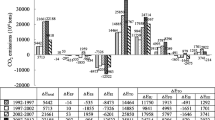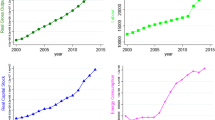Abstract
Global CO2 emissions increased by 57.9% from 1990 to 2014, of which 21% is known to be from the transportation sector. In line with policy development, driving forces to energy consumption and emissions may be determined using decomposition analysis techniques. However, the detail of information required to perform such studies for the transportation sector in developing countries can be challenging. An attempt was made in this study to formulate a decomposition analysis framework considering data availability and limitation in developing countries. Furthermore, a suggestion of adjusting transport activity data using average oil price was proposed. An illustrative case study in the Philippines revealed that the most significant driver was transport activity, followed by energy intensity, and then population growth, which was both similar and contrary to all previous studies performed in developed and rapidly urbanizing countries, which pointed out to transport activity as the primary contributing force. For the Philippines, transport activity was an inhibiting force, whereas energy intensity was the primary contributing factor. The difference could be explained by the differences in mode shares and quality of life between countries. Looking at private vehicle ownership data, it is observed that growth rates are higher in the rural, than in the urban centers. Deriving from the findings, developing a comprehensive public transport plan is recommend for future growth areas, expansion and modernization of public transport services in the city, and strategic deployment of transport policies.
Similar content being viewed by others
References
International Energy Agency. CO2 Emissions from Fuel Combustion: Highlights, 2016 ed. Paris, France, 2016
Kaya Y. Impact of carbon dioxide emission control on GNP growth: interpretation of proposed scenarios. In: Proceedings of the IPCC Energy and Industry Subgroup, Response Strategies Working Group. Paris, France, 1990
Lakshmanan T R, Han X. Factors underlying transportation CO2 emissions in the USA: a decomposition analysis. Transportation Research Part D, Transport and Environment, 1997, 2(1): 1–15
Kwon T. Decomposition of factors determining the trend of CO2 emissions from car travel in Great Britain (1970–2000). Ecological Economics, 2005, 53(2): 261–275
Papagiannaki K, Leontarakis G, Diakoulaki D. Decomposition analysis of CO2 emissions from road transport in EU15. In: Proceedings of the 10th International Conference on Environmental Science and Technology. Kos Island, Greece, 2007
Jian J. A factor decomposition analysis of transportation energy consumption and related policy implications. International Association of Traffic and Safety Sciences, 2015, 38: 142–148
Guo B, Geng Y, Franke B, Hao H, Liu Y, Chiu A. Uncovering China’s transport CO2 emission patterns at the regional level. Energy Policy, 2014, 74: 134–146
Wang W W, Zhang M, Zhou M. Using LMDI method to analyze transport sector CO2 emissions in China. Energy, 2011, 36(10): 5909–5915
Wang Y, Hayashi Y, Kato H, Liu C. Decomposition analysis of CO2 emissions increase from the passenger transport sector in Shanghai, China. International Journal of Urban Sciences, 2011, 15(2): 121–136
Zhang M, Li H, Zhou M, Mu H. Decomposition analysis of energy consumption in Chinese transportation sector. Applied Energy, 2011, 88(6): 2279–2285
Ding J, Jin F, Li Y, Wang J. Analysis of transportation carbon emissions and its potential for reduction in China. Chinese Journal of Population Resources and Environment, 2013, 11(1): 17–25
Wu H, Xu W. Cargo transport energy consumption factors analysis: based on LMDI decomposition technique. In: Proceedings of 2014 International Conference on Environment Systems Science and Engineering. IERI Procedia, 2014, 9: 168–175
Fan R, Lei Y. Decomposition analysis of energy-related carbon emissions from the transportation sector in Beijing. Transportation Research Part D, Transport and Environment, 2016, 42: 135–145
Sumabat A K, Lopez N S, Yu K D, Hao H, Li R, Geng Y, Chiu A S F. Decomposition analysis of Philippine CO2 emissions from fuel combustion and electricity generation. Applied Energy, 2016, 164: 795–804
Mousavi B, Lopez N S A, Biona J B M, Chiu A S F, Blesl M. Driving forces of Iran’s CO2 emissions from energy consumption: an LMDI decomposition approach. Applied Energy, 2017, 206: 804–814
Asian Development Bank. Asian Development Outlook 2017 Update. 2017–12–28, https://doi.org/www.adb.org/data/southeast-asiaeconomy
Ang B W, Zhang F Q, Choi K. Factorizing changes in energy and environmental indicators through decomposition. Energy, 1998, 23(6): 489–495
Ang B W. The LMDI approach to decomposition analysis: a practical guide. Energy Policy, 2005, 33(7): 867–871
Ang B W, Liu N. Energy decomposition analysis: IEA model versus other methods. Energy Policy, 2007, 35(3): 1426–1432
Ang B W. LMDI decomposition approach: a guide for implementation. Energy Policy, 2015, 86: 233–238
Papagiannaki K, Diakoulaki D. Decomposition analysis of CO2 emissions from passenger cars: the cases of Greece and Denmark. Energy Policy, 2009, 37(8): 3259–3267
Bureau of Transportation Statistics. Transportation’s contribution to the economy. 2016, https://doi.org/www.rita.dot.gov/bts/sites/rita.dot.gov.bts/files/Transportation_Economic_Trends_2016_Chapter_2.pdf
Philippine Statistics Authority. 2015 Philippine Statistical Yearbook. 2015, https://doi.org/psa.gov.ph/sites/default/files/2015%20PSY%20PDF_0.pdf
Philippine Department of Energy. Power statistics. 2015–10–08, https://doi.org/www.doe.gov.ph/doe_files/pdf/02_Energy_Statistics/power_statistics_2014.pdf
International Energy Agency. 2017 IEA statistics report. 2017–12–28, https://doi.org/www.iea.org/statistics/statisticssearch/report/year=2014&country=PHILIPPINE&product=Balances
Intergovernmental Panel on Climate Change (IPCC). 2006 guidelines for national greenhouse gas inventories: mobile combustion. 2006, https://doi.org/www.ipcc-nggip.iges.or.jp/public/2006gl/pdf/2_Volume2/V2_3_Ch3_Mobile_Combustion.pdf
Intergovernmental Panel on Climate Change (IPCC). 2006 guidelines for national greenhouse gas inventories: stationary combustion. 2006, https://doi.org/www.ipcc-nggip.iges.or.jp/public/2006gl/pdf/2_Volume2/V2_2_Ch2_Stationary_Combustion.pdf
Environmental Protection Agency (EPA). Emission factors for greenhouse gas inventories. 2014, https://doi.org/www.epa.gov/sites/production/files/2018-03/documents/emission-factors_mar_2018_0.pdf
DiPippo R. Geothermal Power Plants: Principles, Applications, Case Studies and Environmental Impact, 3rd ed. Oxford: Elsevier, 2012
Association of the German Petroleum Industry (MWV). Average annual OPEC crude oil price from 1960 to 2018 (in U.S. Dollars per Barrel). 2018–02–27, www.statista.com/statistics/262858/changein-opec-crude-oil-prices-since-1960/
Démurger S. Infrastructure development and economic growth: an explanation for regional disparities in China? Journal of Comparative Economics, 2001, 29(1): 95–117
Deakin E. Sustainable development and sustainable transportation: strategies for economic prosperity, environmental quality, and equity. 2001, https://doi.org/escholarship.org
Metro Manila Urban Transportation Integration Study (MMUTIS). Metro Manila urban transportation integration study: technical report No. 4.—Transportation demand characteristics based on person trip survey. Japan International Cooperation Agency (JICA), 1999
ALMEC Corporation. Oriental Consultants Global Co., Ltd. The project for capacity development on transportation planning and database management in the Republic of the Philippines, MMUTIS update and capacity enhancement project (MUCEP): transportation demand characteristics based on MUCEP person trip survey. Japan International Cooperation Agency (JICA), 2015
Philippine Statistics Authority. Gross regional domestic product. 2018–03–14, https://doi.org/psa.gov.ph/regional-accounts/grdp/data-and-charts
Land Transportation Office. Registered motor vehicles by classification and region. 2018–03–20, https://doi.org/www.gov.ph/data/dataset/registered-motor-vehicles-classification-and-region
Bloomberg. Philippine GDP growth of 6.9% beats all estimates. 2018–03–14, https://doi.org/www.bloomberg.com/news/articles/2017-11-16/philippine-gdp-growth-exceeds-6-for-a-ninth-consecutive-quarter
Department of Finance, Philippines. Tax reform for acceleration and inclusion. 2018–03–14, https://doi.org/www.dof.gov.ph/taxreform/index.php/vehicle
Acknowledgements
This work was financially supported by the Commission on Higher Education of the Philippines, through the Faculty Development Grant.
Author information
Authors and Affiliations
Corresponding author
Rights and permissions
About this article
Cite this article
Lopez, N.S., Chiu, A.S.F. & Biona, J.B.M. Decomposing drivers of transportation energy consumption and carbon dioxide emissions for the Philippines: the case of developing countries. Front. Energy 12, 389–399 (2018). https://doi.org/10.1007/s11708-018-0578-7
Received:
Accepted:
Published:
Issue Date:
DOI: https://doi.org/10.1007/s11708-018-0578-7




